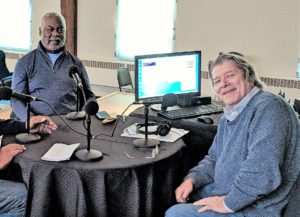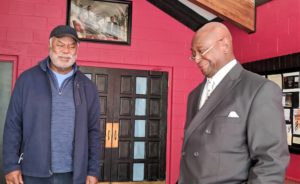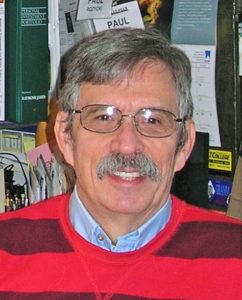By Paul Rozycki
Many tributes to Woodrow Stanley have spoken of his dedication to the Flint community, his service on the Flint City Council, mayor of Flint, the Genesee County Commission, and his role in the State House of Representatives.
Many have spoken of Woodrow’s comeback from a bitter recall campaign as he refused to look back and returned to the political stage for new challenges.
Woodrow Stanley and Mott Community College
But my memories of Woodrow Stanley go back further than that. He was a student at Mott Community College when I first began teaching there. He wasn’t a student in one of my classes, but he got his start in politics with two colleagues of mine in the political science department.
He was a student in Bill Johnson’s class, and when I interviewed Stanley for the college history some years later, he said of Johnson “He always impressed me with his understanding of politics” and “he was always suggesting readings about politics” to him. They remained fast friends, and both became mayors of major cities at about the same time.
Woodrow Stanley was elected mayor of Flint in 1991, and Bill Johnson as mayor of Rochester, New York, in 1993. When Mayor Johnson came back to Mott to speak on several occasions, it was usually Woodrow Stanley who introduced him.
While at Mott, Stanley was a member of the student government, the Black Student Union, and the Volunteer Corps, all of whom served as mentors to other students.
While those times saw a great deal of Black Power activism in college, Stanley’s political skills were apparent when he said, “There was a great deal of cooperation between groups on campus,” and that while the campus was large, “it was possible to get to know and work with many students, faculty and administrators.”
His introduction to local politics
Stanley’s initiation to local politics came in another political science class at Mott. Alice Wallace had invited Mattie Fordham, who was running for the city council, to speak in her class, and after a discussion with Fordham, Woodrow became the manager of her campaign.
She won the primary but fell short in the general election by 57 votes. But that first foray into politics was the start of a long career of political leadership that took Stanley from the Flint City Council, to the mayor’s office, to the Genesee County Commission and the State House of Representatives.
His advice for leadership
Some years later, when psychology professor Lillie McCain and I were putting together a video class on leadership, we interviewed a number of leaders in Michigan and beyond. One of the most impressive discussions was with Woodrow Stanley, who gave us a lengthy interview. He spoke of the need for honesty and integrity in serving as a leader and the need to listen to those you are leading.
A regular on Tom Sumner’s “Armchair Politics”
For the last decade and more Tom Sumner’s radio program has presented “Armchair Politics” as a regular feature on Wednesday mornings. Along with myself and Henry Hatter, Sumner usually invites a rotating third chair for the program as we discuss the politics of the week.

Mayor Woodrow Stanley with Tom Sumner on his radio program. (Photo by Paul Rozycki)
Woodrow Stanley was a regular on the program and was always a source of great insight and humor as the three of us kicked around the events of the week. The last time we did the show together was at the New McCree Theater just after the city council election in November.
His political career
Woodrow Stanley’s political career is well known and will be recounted in many tributes. He served on the Flint City Council for eight years, until he was elected mayor in 1991. He served as mayor until 2002, one of Flint’s longest serving mayors, when he faced a recall as the city faced financial problems.
Even after the bitter recall campaign, he bounced back and was elected to the Genesee County Commission in 2004, serving a chair for a year. In 2008 he was elected to the State House of Representatives, where he served a full three terms until he was term-limited. He also was president of the Michigan Municipal League.
A “politician” in the best sense
One morning on the Tom Sumner Program there was a memorable exchange over the title “politician” that defined Woodrow in a unique way.
So many political leaders reject the politician label, preferring something like “statesman” or “public servant,” but when I used the term he embraced it and said that being a politician, in the best sense of the term, was being someone who could work with people of many different backgrounds and beliefs, and someone who could bounce back from defeats to fight again.
While Woodrow Stanley may have also been a “statesman” or a “public servant,” he was also, a “politician” in the best sense of the word.
A final tribute
Of the many tributes one of the most personal came from Genesee County Commissioner, and Executive Director of the New McCree Theater, Charles Winfrey, who was a major advisor to Stanley when he was mayor. Stanley and Winfrey met at Mott Community College as students, and have been friends since.

Mayor Woodrow Stanley with Genesee County Commissioner and The New McCree Theatre executive director Charles Winfrey. (Photo by Paul Rozycki)
He was quoted by MLive, saying of Stanley’s passing, “I’m shocked. I’ve lost a dear friend. He was really a great man who persevered … He was a true public servant (who was) drastically under-appreciated.”

EVM political commentator Paul Rozycki can be reached at Paul.Rozycki@mcc.edu.


You must be logged in to post a comment.